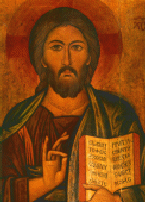|
A more detailed syllabus will be made available on-line to those who have registered for the course via Blackboard. The course will open the first week of classes.
You may access the course via the UofT Blackboard portal. To do this you will need a UTORid and password (which you acquire with your UofT TCard). The first week is largely an "orientation week" - getting used to on-line learning. The entrance to the course will be:

Before registering for this course, students should take the following self-assessment for on-line learning, and ensure that they meet the minimum hardware and software requirements (as noted below).
On-line Course Description:
From the sub-apostolic age to the "Triumph of Orthodoxy" in the East and the Carolingian revival and Treaty of Verdun in the West. Geographical expansion of the church; the relation of Christian faith to cultural settings and other religions; the development of doctrinal and ethical positions; forms of Christian life and worship; the rise of Islam. Weekly readings, weekly on-line discussions and participation, minor research essay. [Course “Outline” given below].
Goals:
1. To read primary- and secondary-sources historically-critically and understand the basic principles of historiography.
2. To acquire or further develop a “historical consciousness” of the period under study, by being able to explain, date and contextualize significant events, people and doctrines in the formation of earliest Christianity.
3. To judge or reflect upon this history’s relevance for contemporary Christianity.
4. To enjoy studying early Christianity.
Course Texts & Readings:
1. Gonzalez, J. The Story of Christianity. Vol. 1. Harper & Row, 1984. (Any edition is acceptable. Available at Crux Bookstore, behind Wycliffe College or at any on-line book-seller).
2. The on-line readings (listed in each unit of study).
Evaluation
1. On-Line Class Discussions/Forums (75%). Evaluated weekly with a letter grade.
2. Written Research Essay (25%).
Format & Workload of the Course
The course will be done completely on-line, in an “asynchronous” framework, via your web-browser and the Blackboard learning management software. That means that you can log in and do your work anytime and anywhere, as long as you fully participate every week. There will be no real-time “chatroom discussions” or “video broadcasts.” The workload expected of students is the same as that of traditional face-to-face courses, that is, about 10-12 hours per week (which includes the on-line discussions).
Each week I will assign readings, which will then be discussed in smaller “learning communities” (much like small tutorial groups) and summed up by a student moderators. Readings will be from the Gonzalez textbook (mentioned above), which is called a “secondary source,” and from “primary sources,” that is, original historical documents in English translation. Some weeks I will ask you to visit another site as part of the weekly assignments.
This is a collaborative-learning & teaching model, where a majority the responsibility for learning and teaching is placed on the student and his/her learning community. If you are not able to participate in a weekly sessions (e.g. illness, family emergencies), I may ask you to do some make-up work. Weekly participation and keeping up with the material is therefore very important.
UTORid Requirements
You require a valid TCard and UTORid (which is assigned to you by your school of registration and the library; please see your college registrar), and an e-mail account. You will not be able to register for or access the course without a UTORid. Click here for more info.
Software Requirements
1. A Web-Browser: Most reasonably recent versions of, for example, Internet Explorer, Netscape, Mozilla or Safari.
2. Blackboard is the learning management software provided by the UofT, which is accessed via a web-browser. Click here for more information about this.
3. Additional Software requirements (most of these items come bundled with your web-browsers, or available at no charge on the internet) are listed here.
Hardware Requirements
1. Computer hardware requirements are listed here.
2. A high speed internet connection (like Bell Sympatico or Rogers High-Speed Internet) is recommended. (See the preceding point for more info). These are not supplied or paid for by the TST colleges.
UofT Software Support
You may purchase additional software at discounted academic prices from Information Commons, License Software Office (http://www.utoronto.ca/ic/softdist/). The UofT provides some software support these items (click here for more info).
1. What Makes a Successful On-Line Student
2. Student On- Line Learning Self-Assessment
1. Introduction - Methodology & Who Were the Early Christians?
- methodology of course; introductions; definition of terms; overview of sources.
2. The Apostolic Church - Mission, Conversion, Church and State
- the spread of Gospel; Judaism; paganism; Didache, Clement of Rome, Hermas, Ignatius; historical-critical reading of the texts.
3. Apologists & Martyrs and Systems of Cosmic Redemption
- Polycarp, Justin, Tatian, Perpetua; Irenaeus & Gnosticism; Montanism.
4. Early Western Authors and North African Christianity
- Tertullian, Hippolytus, Cyprian, Sabellianism.
5. The Early School at Alexandria
- Pantaneus, Clement of Alexandria, & Origen.
6. Early Christologies & Councils (Nicea I)
- Athanasius, Arius, Eusebius, Donatism, Church-State.
7. The Cappadocians, the Spirit-Fighters & Constantinople 1 (381)
- Macrina the Younger, Basil the Great, Gregory Nazianzus, Gregory of Nyssa.
8. Syriac and Asian Christianity& the Roots of Monasticism
- Bardaisan, Aphrahat, Ephraem, Pachomius, Anthony, Basil, Evagrius, Syncletica, Benedict, Patrick.
9. East & West in the Fourth Century
- Ambrose, Augustine, Hilary, Jerome, Vincent of Lérins, John Chrysostom.
10. The Theotokos and Ephesus (431), Chalcedon & Classical Christological Doctrine
- Theodore of Mopseustia, Cyril of Alexandria, Nestorius; Eutyches, Leo and Chalcedon (451).
11. Christological Disputes Continue & Invasions in East & West (6 th - 7 th)
- monotheletism; invasions in the West; Islam in the East; Gregory; Justinian I.
12. The Iconoclastic Crisis in the East & A New Emperor in the West (to 843AD)
- Charlemagne; E & W. relations; iconoclasm & Nicea II (787); the Slavs.
- Conclusion/summary of course.
|

